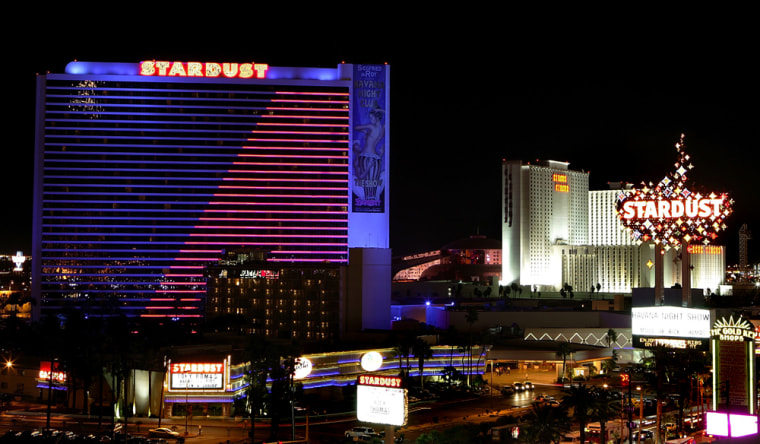Las Vegas has strengthened its claim as the king of convention cities, hosting a record number of the largest trade shows in 2005, new industry rankings released Wednesday show.
And Chicago, the U.S. convention capital for decades until it was dethroned in the 1990s, has tumbled into third place behind Orlando for the first time. Looming as the next threat to overtake it, convention industry experts say, is fourth-place New York.
The latest annual rankings by Tradeshow Week magazine come amid intense competition among cities for a bigger share of the lucrative convention business. Both Las Vegas and Orlando, which landed 44 and 26 of the 200 largest trade shows last year, respectively, have doubled their exhibit space in recent years, improving their ability to attract events and gain bookings.
They also reflect Las Vegas' phenomenal growth and evolution into a world-class city, according to Tradeshow Week publisher Adam Schaffer, confirming that "the Sin City stigma is largely gone."
Not only did the desert city add six major conventions from the previous year, the size of all its large shows rose by 22 percent to a collective 22.6 million square feet, according to Tradeshow Week. That's more than a third of all U.S. square footage combined among the biggest 200 shows.
"Las Vegas is almost a nation unto itself" in the convention business now with its abundance of exhibit space and broad appeal, Schaffer said. "Everybody wants to go to Vegas — they want to go a show, shop, eat, be entertained. It seems to have a formula that is working and not really showing any signs of slowing down."
After ranking second behind Las Vegas for 11 straight years, Chicago hosted six conventions fewer than surging Orlando in 2005. While its total of 20 was up from 18 the year before — the fewest in more than a decade — their combined square footage declined to 6.4 million, by far the smallest total size in the 14 years the Tradeshow Week 200 has been compiled.
Schaffer said a variety of factors produced a new runnerup to Las Vegas, including the explosion of convention space in not only Orlando but elsewhere, such as ones in process or recently completed in Denver, Indianapolis, New Orleans, Philadelphia, Phoenix and New York, where the Jacob K. Javits Convention Center is undergoing a $1.7 billion expansion. New York hosted 16 major trade shows last year, up from 14 in 2004.
Also having an impact, Schaffer said, are the addition of more theme-park attractions in Orlando, the growing lure of warm-weather locations and the labor situation in Chicago.
"The unions in Chicago have not always been easy to work with, and that has caused business to leave the city. That is now changing," he said, referring to new agreements with labor unions last year aimed at making McCormick Place more cost-competitive with other convention centers. "But trade shows book years in advance, so it may be three, four, five years before you see an impact."
Chicago, too, is adding 470,000 square feet of exhibit space in the West Building due to open in July 2007 at McCormick Place. But building new space is "a game almost anybody can play," said trade show industry expert Heywood Sanders, professor of public administration at the University of Texas at San Antonio.
Nationwide, the amount of exhibit space has grown more than 60 percent since 1990 to 64.7 million square feet, even though trade shows don't attract the attendance they used to, he said.
"Chicago has taken a pretty serious hit," and not all because of stringent union rules, Sanders said. "You're talking about a market environment where lots of other cities have an easier time expanding" — such as Las Vegas, which benefits from relatively cheap land and construction costs and an ever-growing source of revenue from the city's hotel room tax.
"In part, Chicago's situation is that it can't stop its competitors from building," he said. "All it can do is try to react."
Tim Roby, president of the Chicago Convention and Tourism Bureau, said customers' booking patterns are cyclical and it's impossible to judge the success of a city based on one year. He said he expects this year to be its best since 2000, when it hosted 22 large shows comprising 11.2 million square feet.
"We are very aware of the increased competition in the marketplace," he said in a written statement. "The new West Building already has more than 40 events booked a year out from its (2007) opening, so we expect to be back in second, if not first, next year."
